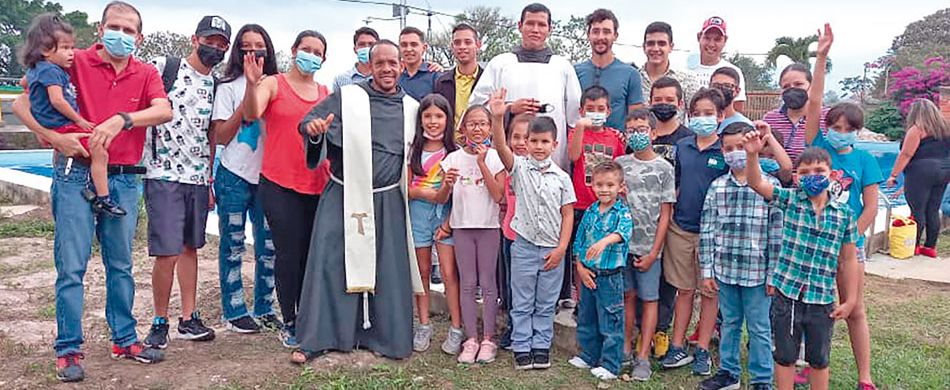Healthy Recreation
FOR THE last 20 years, Venezuela has been in decline, in the grip of a severe economic crisis as a result of government mismanagement. Many of the population now live in extreme poverty. “Many families have taken to the streets to ask for food,” says Friar Carlos Ramón Ortiz Rojas, Rector and Guardian of the San José de Cupertino Missionary Seminary. “There are many children, adolescents, and young people here without a future. They don’t receive the necessary human and Christian education necessary for their ages, and run the risk of falling into prostitution or other vices.”
Given the level of poverty – exacerbated by the COVID-19 pandemic – and the lack of institutions to help these children back into education and give them some hope for the future, the friars came up with a plan for an Aquatic Sports Club within the existing facilities of the seminary. “Various disciplines can be developed there,” explains Friar Carlos. “Aquatic activities such as a swimming school will attract children and young people. We then have the opportunity to educate them – in Humanities, Christianity and Sports. We can give meaning to their lives.”
Swimming pool
The San José de Cupertino Missionary Seminary was founded by the Friars Minor Conventual in 1990. The Order itself has been operating in Venezuela since 1978. It is located in Palmira, which is on the outskirts of San Cristóbal, the capital of Táchira State. “Although the seminary originally covered all stages of training, it now only covers aspirancy and postulancy,” says Friar Carlos. “There are currently four aspirants and six postulants.”
The facilities at the seminary include a 25-metre long, 15-metre wide Olympic swimming pool. It had fallen into disrepair having not been in use for nine years due to damage to the pump and filters. The walls and bottom of the pool had also deteriorated. Due to the economic situation, the seminary could not afford to repair the pool. Some other areas of the seminary structure had also fallen into disrepair due to lack of funds.
The idea for the Aquatic Sports Club came when a local swimming school proposed the recovery of the pool and presented plans to the seminary for a club to help children and young athletes most in need. It would also become a space for education, training, and pastoral care.
The total cost of the project would be €9,800. A local contribution of €2,100 would be collected from those who attend Masses and from other benefactors of the seminary. St Anthony’s Charities was pleased to award the project the sum of €7,700 to allow it to proceed.
Three phases
Work on the pool was carried out in three phases: purchase of a new pump, and then removal and replacement of the damaged filters; renovation of the bottom and walls of the pool; and construction and renovation of the areas surrounding the pool – pavements, changing rooms, shower facilities, and a retaining wall.
The project encountered some economic difficulties. “The crippling inflation in Venezuela meant that as it wasn’t possible to purchase everything at once, the value of the contribution lessened when it was stagnant in the bank,” explains Friar Carlos. “And unfortunately, the contribution had to arrive in dollars rather than euros at an exchange rate of one euro to one dollar – a small sum was also lost in this way. But in spite of these difficulties we made the funds work as hard as possible!”
The renovation work started in January 2022 and was completed on March 17, 2022.
Healthy discipline
“Since March it has been possible to use this beautiful, clean pool in a functional way,” says Friar Carlos. “It has been very positive and significant for the children and young people who come here to learn a sport discipline. They have been able to invest their time learning and dreaming of achieving their goals to be athletes.”
In fact, swimming is a very expensive sport in Venezuela. Most who practice it are from high socio-economic backgrounds. The creation of the Aquatic Sports Club has allowed children and young people from low-income households to participate too. “Children who were once doing nothing or wasting their time doing not so positive things are now coming here to learn a discipline which helps them see life from another perspective – one of education and aspiration,” continues Friar Carlos. “Many parents also see the swimming school as offering help to their children that will prepare them for their future lives.”
Gracias!
The maximum number of children and young people who will be able to benefit from the project is around 120 to 130. At present, 89 are benefiting from the facilities. Of those, 20 have received scholarships and do not have to contribute. Others pay a monthly contribution of US$10, well below the usual clubs which provide their facilities for a fee of US$25 to US$30. This, together with quarterly sport events, will provide funds to maintain the facilities.
A group of young swimmers sent a short video to St Anthony’s Charities to give thanks for the completion of the project. “We would like to thank St Anthony’s Charities because they have helped our dream come true and we can learn to swim,” says one young boy in Spanish before they all say “Gracias!” together.
“I want to thank St Anthony’s Charities and the readers of the Messenger of Saint Anthony from the bottom of my heart for the contributions made to enable us to carry out the initial phase of this project,” concludes Friar Carlos. “This social project will simultaneously integrate help to these young athletes with spiritual guidance. Without your contribution it would have been impossible for us to carry out this project. On behalf of the Order of Friars Minor Conventual of Venezuela, the coaches, and representatives of all the athletes we thank you for the attention you have given us and for helping us economically with this ongoing project.”



